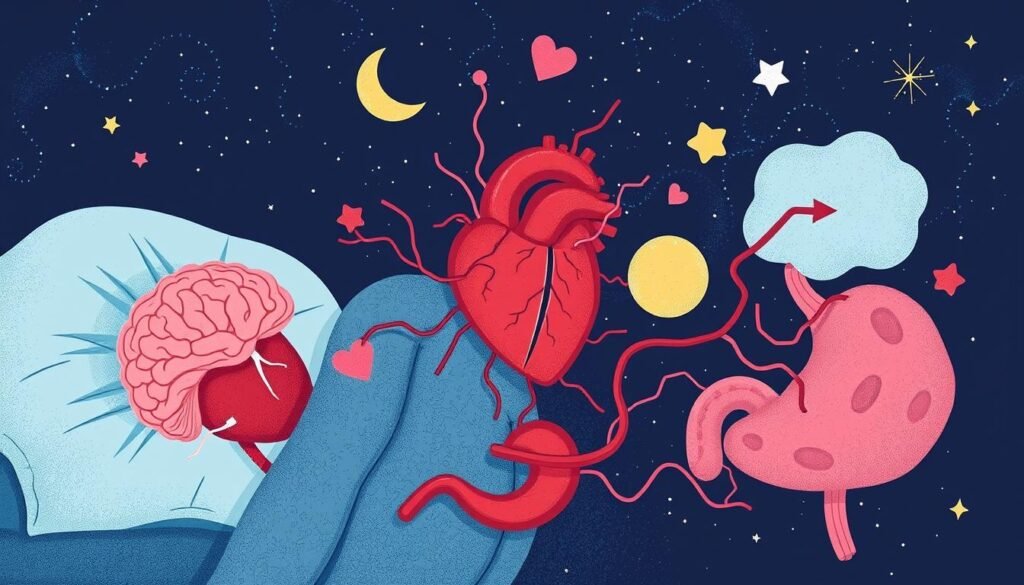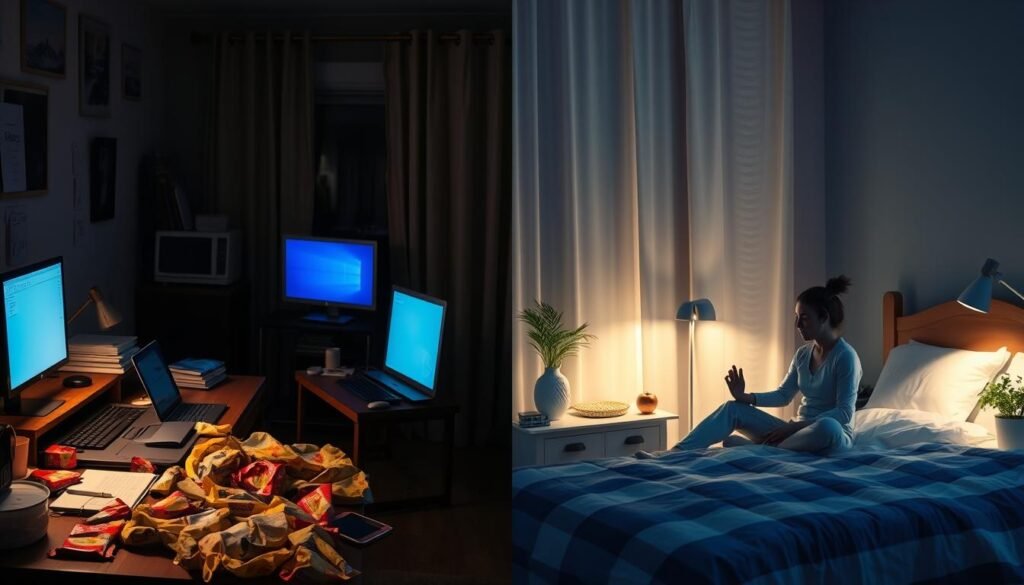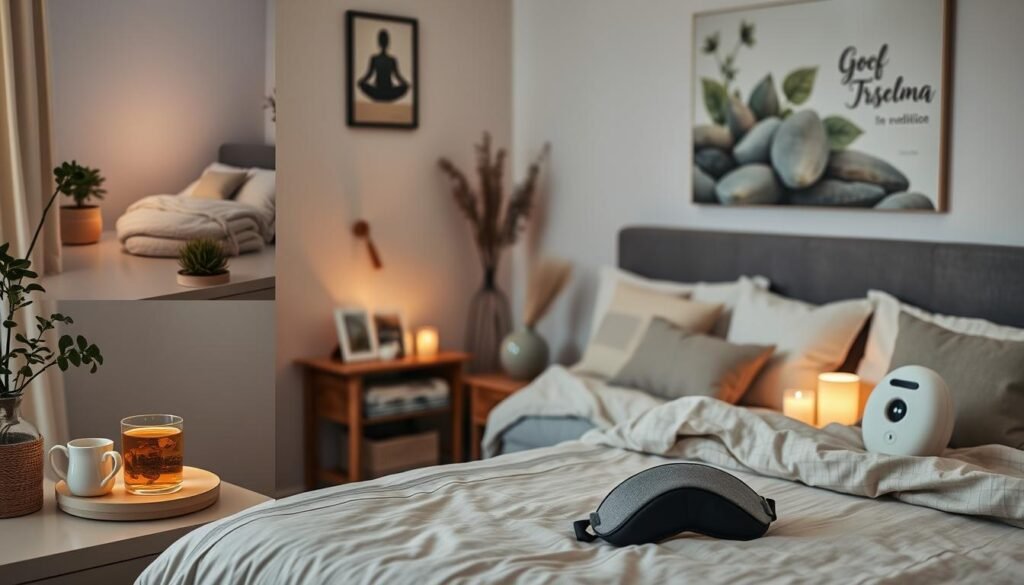Did you know that up to 35% of adults in the United States struggle with insomnia? This fact points out how common this sleep issue is. It can result in sleep deprivation, which hurts our health, mood, and how well we do at work. Knowing what causes severe chronic insomnia is needed for good treatment and care.
Many things lead to this condition that makes getting good sleep hard. Lifestyle choices and health problems are main causes. It’s crucial to maintain proper sleep habits for our well-being.
Key Takeaways
- Chronic insomnia affects approximately 10% of adults.
- It can severely impact mood, health, and work performance.
- Understanding underlying causes is critical for effective treatment.
- Lifestyle choices play a significant role in sleep disorders.
- Medical conditions, including mental health disorders, can lead to insomnia.
- Effective sleep hygiene practices can improve overall sleep quality.
Understanding Chronic Insomnia
A lot of people suffer from chronic insomnia, with up to 15% of folks having trouble sleeping. This sleep issue means having problems at least three nights every week for more than three months. Not just making you feel tired, chronic insomnia can also cause severe health problems like anxiety and heart issues.
Many things can cause chronic insomnia. Stress, worry, and some health conditions can mess up your sleep. Bad habits, like too much phone time at night or drinking caffeine, can also affect sleep. It’s important to know that this can happen to anyone. Yet, women going through menopause and older people might be more at risk.
Fixing insomnia usually means changing your lifestyle and getting help from experts. Insomnia treatment that works well includes Cognitive Behavioral Therapy for Insomnia (CBT-I). It tackles the root problems of insomnia. Also, good sleep habits, such as keeping a regular bedtime and making your bedroom comfy, can improve sleep and stop insomnia from coming back.
Getting the hang of chronic insomnia’s tricky parts is key to handling it well. By taking steps and getting the right support, people can get back to sleeping well. This improves life quality all around.
Common Symptoms of Severe Chronic Insomnia
Severe chronic insomnia greatly affects daily life and overall health. People with this issue face many troubling symptoms of insomnia. These symptoms can really hold someone back.
- Difficulty falling asleep
- Frequent awakenings throughout the night
- Waking up too early with an inability to return to sleep
- Daytime fatigue and lack of energy
Sleep deprivation leads to many negative effects. Feelings like irritation and mood swings become more common. It can also harm one’s ability to focus and remember things. Plus, there’s a higher chance of accidents, especially when driving, due to feeling sleepy and less alert.
Experts say most adults need 7 to 9 hours of sleep each night. If chronic insomnia lasts for three months or more, it lowers quality of life. Older adults and women, especially during pregnancy or menopause, are more at risk.
The impact of sleep deprivation goes beyond just feeling tired. It also hurts emotional health, making people more likely to face anxiety and depression. Knowing the signs and getting the right help is key for those struggling with chronic insomnia.
What Causes Severe Chronic Insomnia
Chronic insomnia stems from various factors that overlap. It’s key to understand these to improve sleep. Among these are stress and anxiety disorders, mood changes from depression, and your body’s internal clock getting out of sync.
Stress and Anxiety Disorders
Managing stress is key to tackling severe chronic insomnia. Anxiety keeps your body alert, making sleep hard. Stress cranks up cortisol, the stress hormone, messing with your sleep. This creates a hard cycle to break, pushing people to find stress and sleep solutions.
Depression’s Impact on Sleep
Depression hits sleep quality hard. Many with it also face insomnia. Over half with mental health issues suffer from this insomnia, data shows. This leads to waking up early or trouble falling asleep. The worse sleep gets, the harder depression hits, making a tough cycle to break.
Circadian Rhythm Disruption
Circadian rhythm issues are big in causing severe chronic insomnia. Shift work or jet lag throws off your sleep-wake cycle. This messes with sleep quality and length, making regular sleep tough. Fixing this misalignment is key to normal sleep.
| Factor | Effect on Sleep | Management Strategies |
|---|---|---|
| Stress and Anxiety Disorders | Increased arousal; difficulty relaxing | Meditation, therapy, exercise |
| Depression | Early awakenings; prolonged difficulty sleeping | Cognitive Behavioral Therapy, medication |
| Circadian Rhythm Disruption | Irregular sleep patterns; sleep onset difficulties | Consistent sleep schedule, light exposure |
Medical Conditions Linked to Insomnia
It’s vital to understand how insomnia relates to medical conditions to treat it well. Chronic insomnia can come from various illnesses and sleep issues. These can stop you from getting the deep sleep you need.
Physical Illness and Pain
Many health problems can lead to insomnia. Conditions like chronic pain, breathing issues, and diabetes can hurt your sleep. Pain or waking up often can make insomnia worse. It’s important to treat these health issues to help with insomnia.
Sleep can suffer from pain, causing a cycle of more pain and sleep problems. Helping with the health issues causing the pain can improve sleep.
Other Sleep Disorders
Other sleep issues can also harm sleep quality. Sleep disorders like sleep apnea and restless legs syndrome are common in those with sleep troubles. Sleep apnea makes breathing hard during sleep, causing poor sleep and tiredness. Restless legs syndrome can make you need to move your legs at night.
It disrupts sleep. Treating these conditions is key to better sleep and health.
| Medical Condition | Impact on Sleep | Possible Insomnia Treatment |
|---|---|---|
| Chronic Pain | Discomfort leading to difficulty falling or staying asleep | Medication management and physical therapy |
| Diabetes | Nerve pain and nocturnal hypoglycemia disrupt sleep | Blood sugar management and sleep hygiene strategies |
| Obstructive Sleep Apnea | Intermittent airway obstruction causes awakenings | Continuous positive airway pressure (CPAP) therapy |
| Restless Legs Syndrome | Urge to move legs disrupts sleep onset and maintenance | Medications and lifestyle modifications |
Treating these conditions is crucial for better sleep and less risk of insomnia. Knowing the link between health and sleep helps in finding good treatments for insomnia. For tips on handling sleep disorders, check out effective solutions.

The Role of Medications in Insomnia
Medications are key in managing insomnia, affecting millions in the U.S. People look for treatment through different medications, but choosing can be tricky. Some, like antihistamines, may help you sleep but cause side effects such as cognitive issues and daytime tiredness.
The use of sedatives has changed over the years. In the 1990s, about 2.6% of adults used prescription sedatives, and 3.1% used over-the-counter sleep aids. Now, there’s more caution in using these medications due to their long-term effects.
There are various medications based on sleep issues. For trouble falling asleep, drugs like Eszopiclone (Lunesta) and Zolpidem tartrate (Ambien) are options. For issues staying asleep, Doxepin hydrochloride (Silenor) and Suvorexant (Belsomra) might help.
It’s important to balance medication use with the risk of dependency. Many doctors suggest cognitive behavioral therapy (CBT) as the main treatment. It’s often better than meds alone. Prescription sleep pills should only be a short-term solution to avoid complications.
Choosing the right meds for sleep disorders is crucial. Sedating antidepressants could be good for those with insomnia and depression. Given that 70 million adults in the U.S. have chronic sleep issues, a blend of lifestyle changes and medication is key for effective treatment.
| Medication Type | Indication | Common Examples |
|---|---|---|
| Prescription Sedatives | Difficulty falling asleep | Eszopiclone (Lunesta), Zolpidem (Ambien) |
| Prescription Hypnotics | Difficulty staying asleep | Doxepin (Silenor), Suvorexant (Belsomra) |
| Over-the-Counter | General insomnia support | Diphenhydramine (Benadryl) |
| Antidepressants | Insomnia associated with depression | Sertraline, Trazodone |
Lifestyle Choices Affecting Sleep
Lifestyle choices are key to good sleep. Making good changes can really help improve your sleep and fight insomnia. But bad sleep habits can make getting a good night’s sleep hard. It’s important to know how our actions affect how well we sleep.
Unhealthy Sleep Habits
Some people have bad sleep habits that make insomnia worse. These habits include:
- Irregular sleep schedules, which confuse our body’s internal clock.
- Too much screen time before bed makes it hard to sleep due to blue light.
- Using the bed for things other than sleeping, like work or eating. This makes the bed a place for being awake, not sleeping.
It’s really important to recognize and fix these bad habits. Doing this can make our sleep better and our nights more restful.
Diet and Stimulants
What we eat also affects our sleep. Certain foods and drinks can make it hard to sleep:
- Having caffeine within six hours of bedtime can keep us awake, as it stays in the system and messes with sleep.
- Alcohol might relax us at first, but it often leads to bad sleep quality.
- Eating a balanced diet like the Mediterranean or DASH diets can help with sleep quality. This shows that good eating habits support better sleep.
Understanding how diet and sleep connect is key for improving sleep. By eating less stimulants and choosing healthier foods, we can sleep better.

Stress Management Techniques for Better Sleep
The link between stress and sleep issues is complex. Managing stress well is key to reducing insomnia and sleeping better. Activities that relax you can lead to peaceful sleep.
Mindfulness meditation and deep breathing are great for lessening stress. Doing these regularly can make your sleep better. A regular bedtime routine prepares your body to rest. This might include reading, stretching, or soft music. Such habits are crucial in dealing with insomnia.
Being active daily boosts your health. Practices like yoga or tai chi trigger the body’s calm response, lowering stress. Regularly doing these activities helps manage stress and improves sleep.
If you’re often stressed, finding ways to handle it is key. Techniques like progressive muscle relaxation aid those with stress-induced insomnia. Finding support through groups or therapy offers needed motivation. Cognitive restructuring changes how you view stress, helping break the stress and sleeplessness cycle.
| Technique | Description | Benefits for Sleep |
|---|---|---|
| Mindfulness Meditation | Focused attention on the present moment. | Reduces anxiety and fosters relaxation. |
| Deep Breathing Exercises | Controlled breathing to induce calmness. | Lowers stress levels and helps improve sleep onset. |
| Yoga | Mind and body practice combining postures, breathing, and meditation. | Enhances flexibility, reduces tension, and promotes better sleep quality. |
| Progressive Muscle Relaxation | Sequentially tensing and relaxing muscle groups. | Effective for managing stress-related insomnia and enhancing relaxation. |
Understanding the power of relaxing activities can change how you sleep. Those battling insomnia should try these methods. The right approach can greatly improve your sleep and health. For more tips on beating stress, check out this resource.
Insomnia Treatment Options
To fight insomnia, we need a plan that covers many areas. It’s important to work on good sleep habits. Seeing a professional for mental health issues also helps improve sleep over time.
Implementing Sleep Hygiene Practices
Having good sleep habits is key for better sleep. Here are ways to sleep better:
- Maintain a regular sleep schedule by going to bed and waking up at the same time every day.
- Establish a comfortable sleep environment, keeping the bedroom dark, quiet, and cool.
- Avoid heavy meals and alcohol shortly before bedtime to facilitate easier sleep onset.
- Limit the use of electronic devices in the hour leading up to sleep, as blue light can interfere with melatonin production.
- Engage in moderate exercise, such as walking or yoga, for 20–30 minutes several times a week to promote relaxation.
Professional Mental Healthcare
Seeking help from mental health experts is important for treating insomnia. They look into and treat causes like anxiety, depression, or stress. Depending on the person, treatment might include:
- Cognitive Behavioral Therapy for Insomnia (CBT-I) to modify negative thoughts and behaviors surrounding sleep.
- Medication options such as benzodiazepine sedatives (e.g., triazolam), non-benzodiazepine sedatives (e.g., zolpidem), or orexin receptor antagonists (e.g., suvorexant).
- Mind/body medicine techniques like meditation or biofeedback to reduce stress and promote relaxation.

Preventing Severe Chronic Insomnia
Preventing insomnia is key for those at risk of chronic sleep issues. Having a set sleep schedule helps keep a healthy sleep cycle. Adults need 7 to 9 hours of sleep each night to be their best. Kids and babies need different amounts.
Sticking to regular sleep and wake times boosts sleep health. This habit is important.
Staying active during the day helps you sleep better at night. Even a simple walk can reduce stress and anxiety, which often cause sleep problems. A calm bedtime routine gets your body ready for sleep, making you feel better overall.
Creating a good sleeping space is also important. A room that’s dark, quiet, and has comfy bedding helps avoid sleep disturbances. Staying away from caffeine, nicotine, and alcohol before bed is key. These small changes can greatly improve how well you sleep.
Learning to manage stress well is crucial to prevent insomnia. Techniques like deep breathing, meditation, and being mindful help relax you before bed. It’s important to deal with any stress or anxiety early to stop insomnia before it starts.
The following table summarizes key strategies for preventing severe chronic insomnia:
| Prevention Strategy | Description |
|---|---|
| Consistent Sleep Schedule | Go to bed and wake up at the same time daily. |
| Regular Exercise | Engage in physical activity during the day, avoiding vigorous exercise close to bedtime. |
| Relaxing Bedtime Routine | Incorporate calming activities, such as reading or gentle stretching. |
| Optimal Sleep Environment | Keep the bedroom dark, quiet, and cool, using comfortable bedding. |
| Avoid Stimulants | Limit caffeine, nicotine, and alcohol intake, especially before bed. |
| Stress Management | Practice techniques like meditation or deep breathing. |
By adding these steps into your life, you can cut down on sleep issues and sleep better. Taking proactive steps is key to better sleep and health.
Conclusion
It’s key to know the causes of severe chronic insomnia for good management and treatment. About 10% of people are affected, leading to poor sleep and well-being. Understanding the role of stress, health issues, and lifestyle is important for better sleep.
Insomnia doesn’t just hurt the person; it also raises healthcare costs and lowers work quality. Surprisingly, 60% of those with insomnia don’t talk to doctors about it. This shows a big gap in getting help. Making sleep habits better, eating well, and getting mental health care can help a lot.
For more insights into insomnia and psychiatric disorders, and how to treat it, visit this source. Using many methods to tackle sleep problems can make life healthier and more balanced.